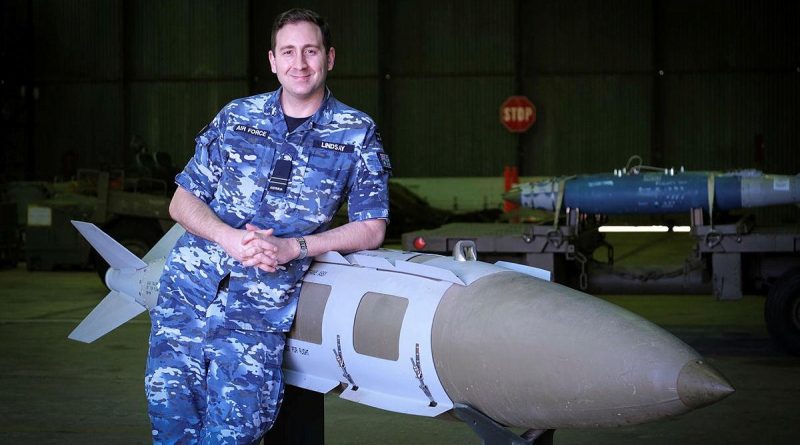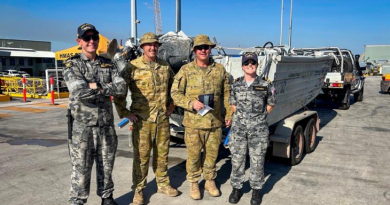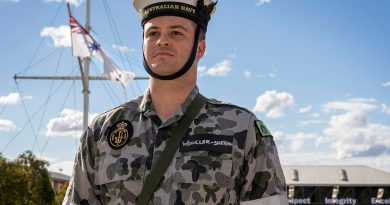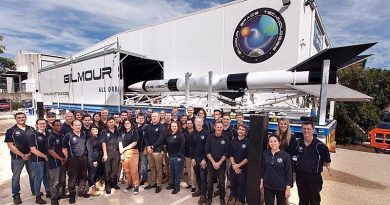Engineering opens a world of opportunities

Flight Lieutenant Ben Lindsay’s enthusiasm for maths, science and engineering can be traced back to his parents, who are high school teachers.
CAPTION: Defence Explosive Ordnance Training School instructor Flight Lieutenant Ben Lindsay with a teaching aid, a 2000-pound joint direct attack munition. Story by Flight Lieutenant Julia Ravell.
Now aged 30, his passion has taken him all around the world.
Flight Lieutenant Lindsay completed his schooling across three countries: years six to eight in the United States, years nine and 10 in the United Kingdom and he was top of his classes in Maths B and C, physics and chemistry at Queensland’s Bundaberg State High School, where he completed year 12 with the highest possible university entrance score.
With these credentials, Flight Lieutenant Lindsay could have gone anywhere and studied anything.
He chose a Defence-sponsored undergraduate mechanical engineering course at the Australian Defence Force Academy (ADFA) because the Engineers Australia accreditation it offered was a passport to worldwide employment as well as an opportunity to create, design and improve transformative systems using robotics and advanced-materials technology.
“My undergraduate engineering degree taught me how to solve technical problems and I’ve used these general skills in guided-weapon sustainment and operational fighter squadron maintenance roles,” Flight Lieutenant Lindsay said.
“As an explosive ordnance engineering instructor at the Defence Explosive Ordnance Training School (DEOTS), I also draw heavily on masters-level study in explosive ordnance engineering that I completed at Cranfield University while attached to the UK’s Defence Academy in 2019.
“I worked towards this career goal to get to Cranfield as soon as I’d heard about it at ADFA.
“I won a competitive selection process and spent a year living on the UK Defence Force Academy campus in Shrivenham, a quaint village in Oxfordshire.
“[There I gained the] specialised knowledge in explosive ordnance engineering that I’m applying every day at DEOTS in my dual roles as instructor and second-in-charge of training development and evaluation at the school.”
Flight Lieutenant Lindsay said his dual role at DEOTS placed him in a unique position to assess the efficacy of his classroom innovations and receive direct student feedback.
“I’m really enjoying my roles at DEOTS because I’m able to see my curriculum developments put into action,” he said.
“I appreciate interacting with students from a huge variety of backgrounds, including other armed forces and the public service, who are doing their initial employment training in explosive ordnance.”
COVID-19 restrictions accelerated DEOTS’ plans to move its courses online.
The innovation of Flight Lieutenant Lindsay and his team quadrupled the number of graduates this past year as they had opened course enrolments to candidates who could complete programs flexibly from any location.
“We’re modularising our explosive ordnance engineering course, currently a monolithic fire hose of information, into bundles of lessons that are service-agnostic and can be taken selectively by anyone who has a high-level role with weapons and weapons systems,” Flight Lieutenant Lindsay said.
“It’s been a career highlight to see trainees develop and at the same time test my curriculum developments in action.”
Four weeks into teaching the Air Force’s specialist 14-week armaments engineering course, Flight Lieutenant Lindsay hasn’t had a lot of spare time.
But when he does, he takes his beloved Great Dane-cross Ellie to leash-free areas, reads, plays an eclectic variety of video games and gets together with friends over long restaurant dinners.
.
.

.
.





